What drives employees to share their tactic knowledge in practice
VerifiedAdded on 2023/06/03
|8
|1739
|456
AI Summary
This article discusses the motivational factors that influence employees to utilize their skills and knowledge for the benefit of the organization. It identifies specific motivational factors and barriers to staff motivation, and provides recommendations to help organizations motivate their staffs to use their tactic knowledge and promote their competitive advantage.
Contribute Materials
Your contribution can guide someone’s learning journey. Share your
documents today.
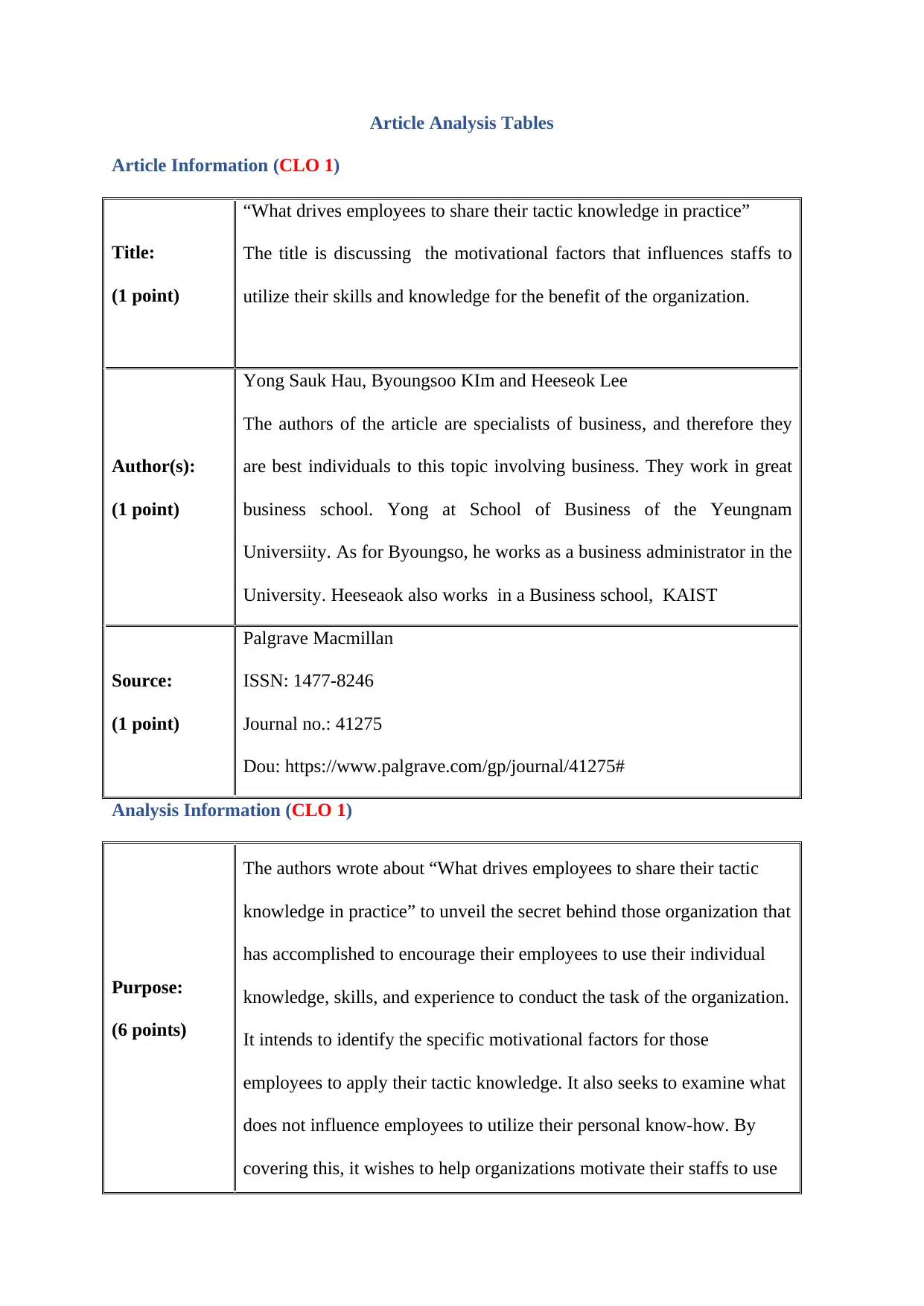
Article Analysis Tables
Article Information (CLO 1)
Title:
(1 point)
“What drives employees to share their tactic knowledge in practice”
The title is discussing the motivational factors that influences staffs to
utilize their skills and knowledge for the benefit of the organization.
Author(s):
(1 point)
Yong Sauk Hau, Byoungsoo KIm and Heeseok Lee
The authors of the article are specialists of business, and therefore they
are best individuals to this topic involving business. They work in great
business school. Yong at School of Business of the Yeungnam
Universiity. As for Byoungso, he works as a business administrator in the
University. Heeseaok also works in a Business school, KAIST
Source:
(1 point)
Palgrave Macmillan
ISSN: 1477-8246
Journal no.: 41275
Dou: https://www.palgrave.com/gp/journal/41275#
Analysis Information (CLO 1)
Purpose:
(6 points)
The authors wrote about “What drives employees to share their tactic
knowledge in practice” to unveil the secret behind those organization that
has accomplished to encourage their employees to use their individual
knowledge, skills, and experience to conduct the task of the organization.
It intends to identify the specific motivational factors for those
employees to apply their tactic knowledge. It also seeks to examine what
does not influence employees to utilize their personal know-how. By
covering this, it wishes to help organizations motivate their staffs to use
Article Information (CLO 1)
Title:
(1 point)
“What drives employees to share their tactic knowledge in practice”
The title is discussing the motivational factors that influences staffs to
utilize their skills and knowledge for the benefit of the organization.
Author(s):
(1 point)
Yong Sauk Hau, Byoungsoo KIm and Heeseok Lee
The authors of the article are specialists of business, and therefore they
are best individuals to this topic involving business. They work in great
business school. Yong at School of Business of the Yeungnam
Universiity. As for Byoungso, he works as a business administrator in the
University. Heeseaok also works in a Business school, KAIST
Source:
(1 point)
Palgrave Macmillan
ISSN: 1477-8246
Journal no.: 41275
Dou: https://www.palgrave.com/gp/journal/41275#
Analysis Information (CLO 1)
Purpose:
(6 points)
The authors wrote about “What drives employees to share their tactic
knowledge in practice” to unveil the secret behind those organization that
has accomplished to encourage their employees to use their individual
knowledge, skills, and experience to conduct the task of the organization.
It intends to identify the specific motivational factors for those
employees to apply their tactic knowledge. It also seeks to examine what
does not influence employees to utilize their personal know-how. By
covering this, it wishes to help organizations motivate their staffs to use
Secure Best Marks with AI Grader
Need help grading? Try our AI Grader for instant feedback on your assignments.
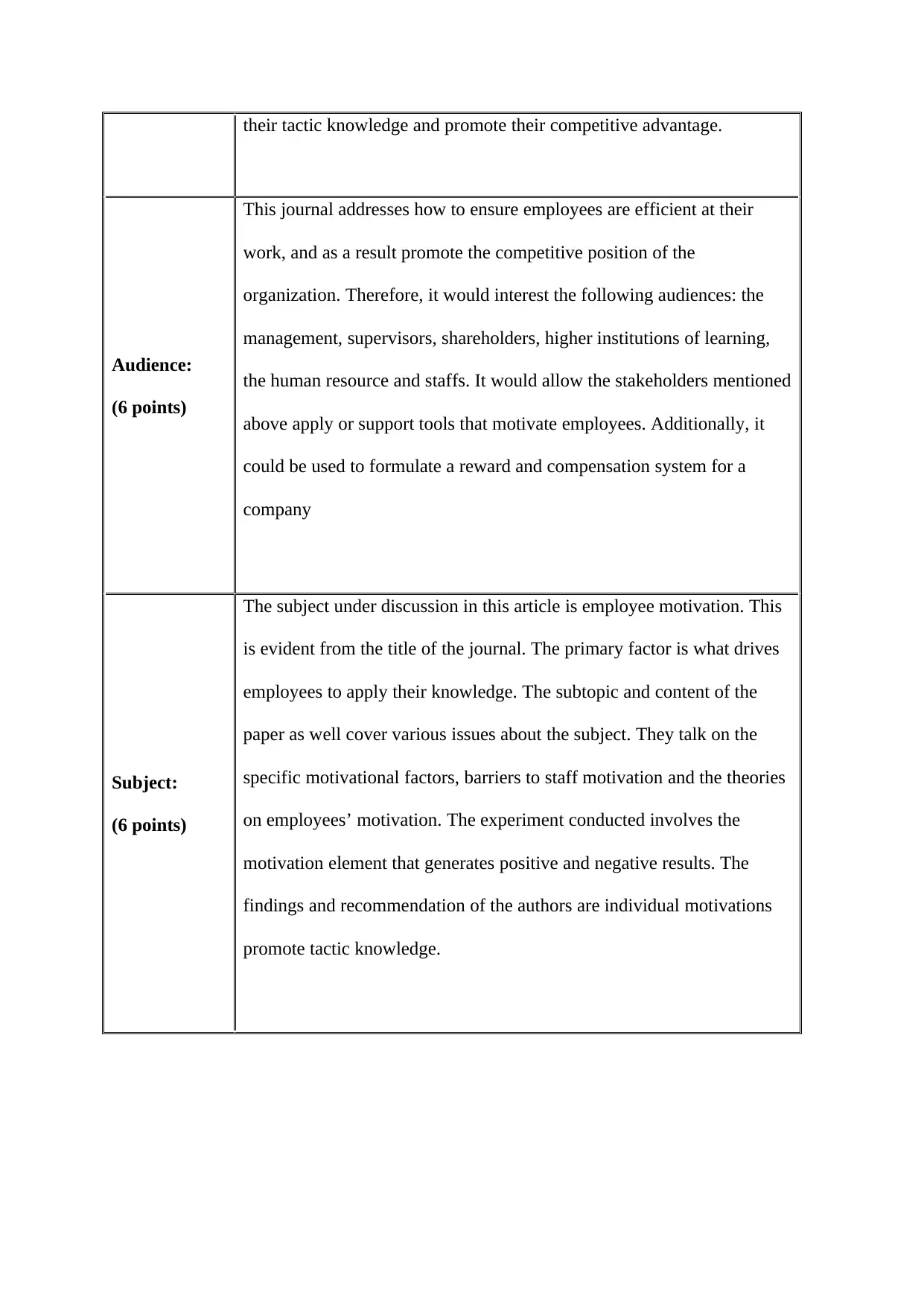
their tactic knowledge and promote their competitive advantage.
Audience:
(6 points)
This journal addresses how to ensure employees are efficient at their
work, and as a result promote the competitive position of the
organization. Therefore, it would interest the following audiences: the
management, supervisors, shareholders, higher institutions of learning,
the human resource and staffs. It would allow the stakeholders mentioned
above apply or support tools that motivate employees. Additionally, it
could be used to formulate a reward and compensation system for a
company
Subject:
(6 points)
The subject under discussion in this article is employee motivation. This
is evident from the title of the journal. The primary factor is what drives
employees to apply their knowledge. The subtopic and content of the
paper as well cover various issues about the subject. They talk on the
specific motivational factors, barriers to staff motivation and the theories
on employees’ motivation. The experiment conducted involves the
motivation element that generates positive and negative results. The
findings and recommendation of the authors are individual motivations
promote tactic knowledge.
Audience:
(6 points)
This journal addresses how to ensure employees are efficient at their
work, and as a result promote the competitive position of the
organization. Therefore, it would interest the following audiences: the
management, supervisors, shareholders, higher institutions of learning,
the human resource and staffs. It would allow the stakeholders mentioned
above apply or support tools that motivate employees. Additionally, it
could be used to formulate a reward and compensation system for a
company
Subject:
(6 points)
The subject under discussion in this article is employee motivation. This
is evident from the title of the journal. The primary factor is what drives
employees to apply their knowledge. The subtopic and content of the
paper as well cover various issues about the subject. They talk on the
specific motivational factors, barriers to staff motivation and the theories
on employees’ motivation. The experiment conducted involves the
motivation element that generates positive and negative results. The
findings and recommendation of the authors are individual motivations
promote tactic knowledge.
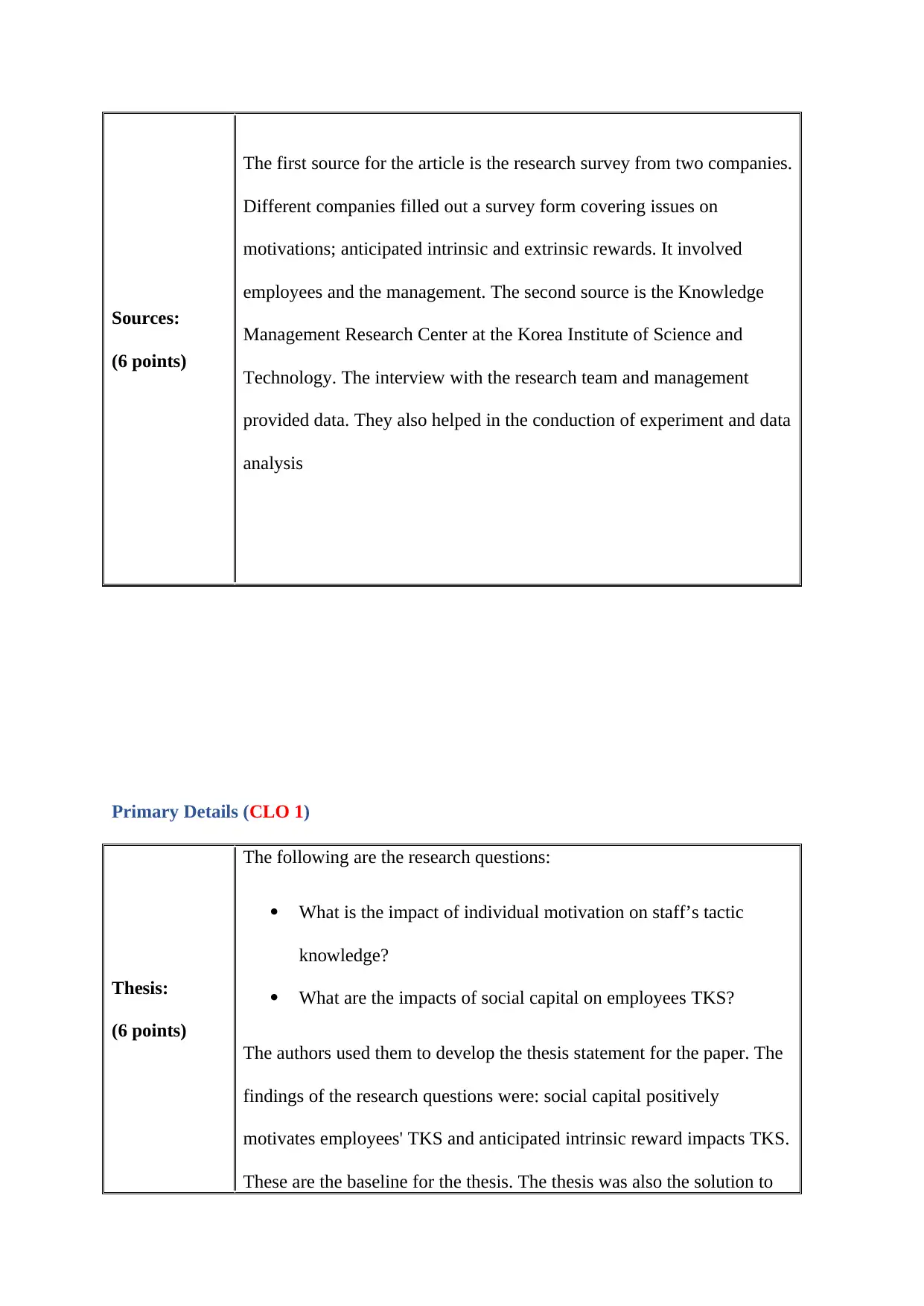
Sources:
(6 points)
The first source for the article is the research survey from two companies.
Different companies filled out a survey form covering issues on
motivations; anticipated intrinsic and extrinsic rewards. It involved
employees and the management. The second source is the Knowledge
Management Research Center at the Korea Institute of Science and
Technology. The interview with the research team and management
provided data. They also helped in the conduction of experiment and data
analysis
Primary Details (CLO 1)
Thesis:
(6 points)
The following are the research questions:
What is the impact of individual motivation on staff’s tactic
knowledge?
What are the impacts of social capital on employees TKS?
The authors used them to develop the thesis statement for the paper. The
findings of the research questions were: social capital positively
motivates employees' TKS and anticipated intrinsic reward impacts TKS.
These are the baseline for the thesis. The thesis was also the solution to
(6 points)
The first source for the article is the research survey from two companies.
Different companies filled out a survey form covering issues on
motivations; anticipated intrinsic and extrinsic rewards. It involved
employees and the management. The second source is the Knowledge
Management Research Center at the Korea Institute of Science and
Technology. The interview with the research team and management
provided data. They also helped in the conduction of experiment and data
analysis
Primary Details (CLO 1)
Thesis:
(6 points)
The following are the research questions:
What is the impact of individual motivation on staff’s tactic
knowledge?
What are the impacts of social capital on employees TKS?
The authors used them to develop the thesis statement for the paper. The
findings of the research questions were: social capital positively
motivates employees' TKS and anticipated intrinsic reward impacts TKS.
These are the baseline for the thesis. The thesis was also the solution to
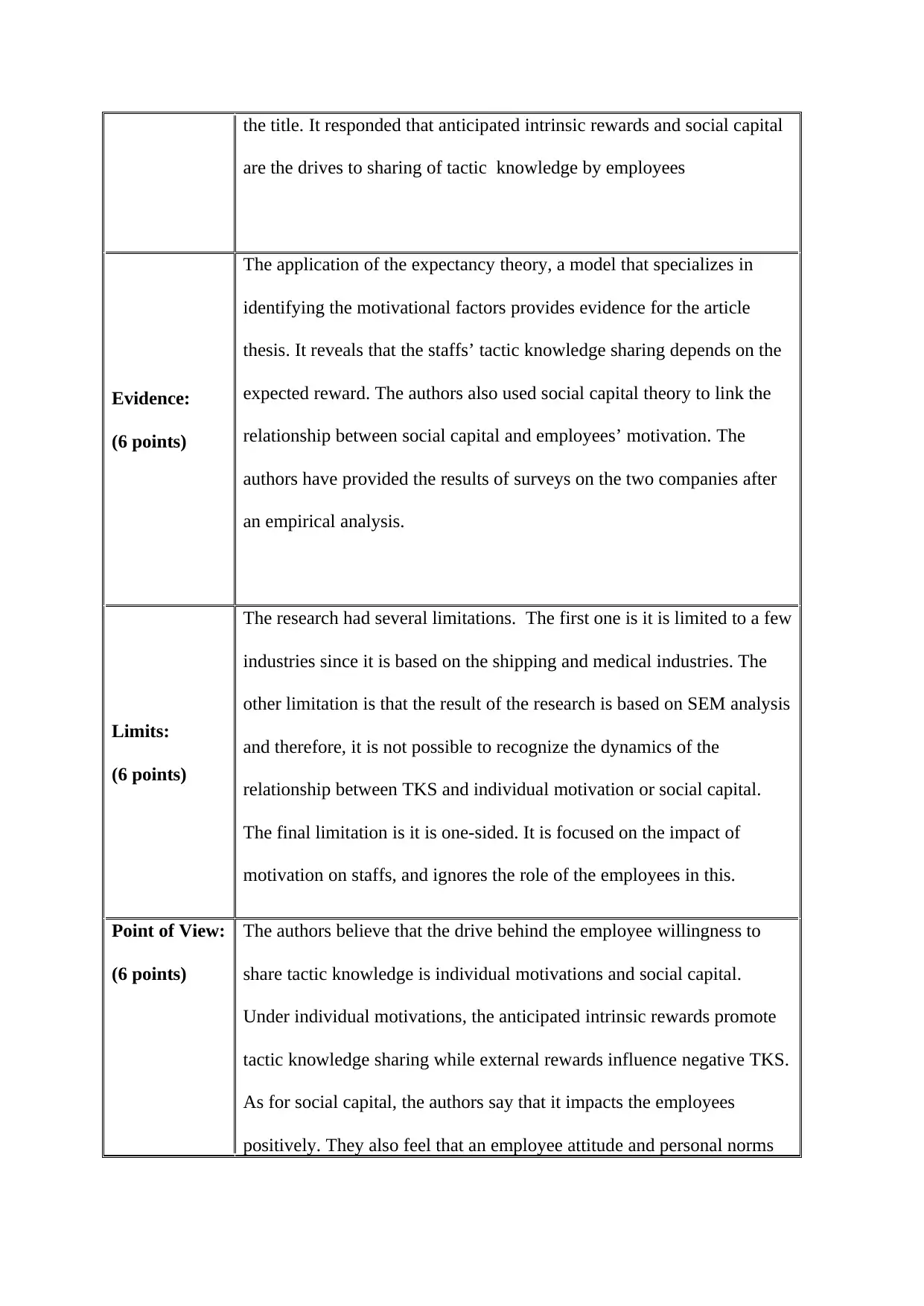
the title. It responded that anticipated intrinsic rewards and social capital
are the drives to sharing of tactic knowledge by employees
Evidence:
(6 points)
The application of the expectancy theory, a model that specializes in
identifying the motivational factors provides evidence for the article
thesis. It reveals that the staffs’ tactic knowledge sharing depends on the
expected reward. The authors also used social capital theory to link the
relationship between social capital and employees’ motivation. The
authors have provided the results of surveys on the two companies after
an empirical analysis.
Limits:
(6 points)
The research had several limitations. The first one is it is limited to a few
industries since it is based on the shipping and medical industries. The
other limitation is that the result of the research is based on SEM analysis
and therefore, it is not possible to recognize the dynamics of the
relationship between TKS and individual motivation or social capital.
The final limitation is it is one-sided. It is focused on the impact of
motivation on staffs, and ignores the role of the employees in this.
Point of View:
(6 points)
The authors believe that the drive behind the employee willingness to
share tactic knowledge is individual motivations and social capital.
Under individual motivations, the anticipated intrinsic rewards promote
tactic knowledge sharing while external rewards influence negative TKS.
As for social capital, the authors say that it impacts the employees
positively. They also feel that an employee attitude and personal norms
are the drives to sharing of tactic knowledge by employees
Evidence:
(6 points)
The application of the expectancy theory, a model that specializes in
identifying the motivational factors provides evidence for the article
thesis. It reveals that the staffs’ tactic knowledge sharing depends on the
expected reward. The authors also used social capital theory to link the
relationship between social capital and employees’ motivation. The
authors have provided the results of surveys on the two companies after
an empirical analysis.
Limits:
(6 points)
The research had several limitations. The first one is it is limited to a few
industries since it is based on the shipping and medical industries. The
other limitation is that the result of the research is based on SEM analysis
and therefore, it is not possible to recognize the dynamics of the
relationship between TKS and individual motivation or social capital.
The final limitation is it is one-sided. It is focused on the impact of
motivation on staffs, and ignores the role of the employees in this.
Point of View:
(6 points)
The authors believe that the drive behind the employee willingness to
share tactic knowledge is individual motivations and social capital.
Under individual motivations, the anticipated intrinsic rewards promote
tactic knowledge sharing while external rewards influence negative TKS.
As for social capital, the authors say that it impacts the employees
positively. They also feel that an employee attitude and personal norms
Secure Best Marks with AI Grader
Need help grading? Try our AI Grader for instant feedback on your assignments.
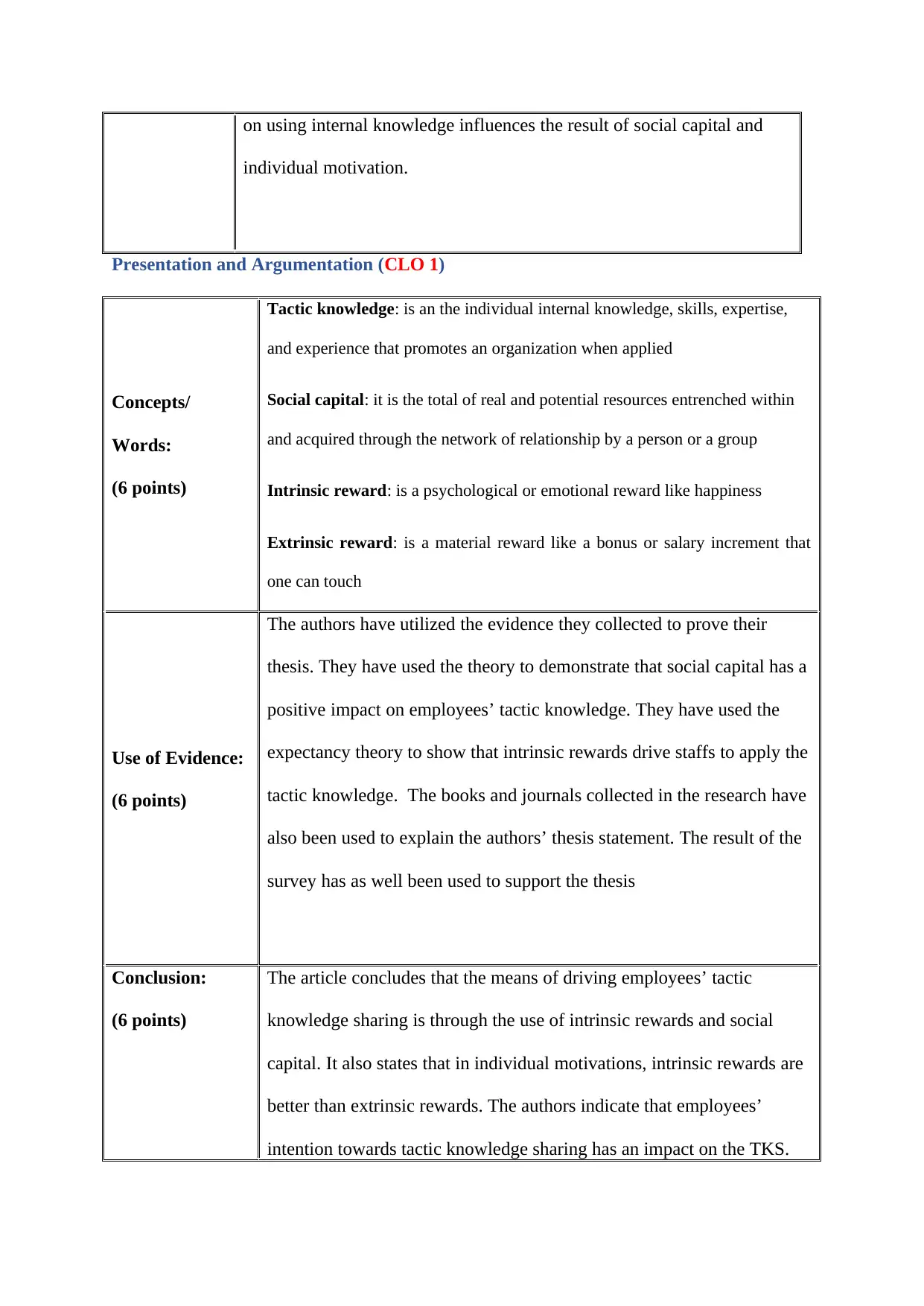
on using internal knowledge influences the result of social capital and
individual motivation.
Presentation and Argumentation (CLO 1)
Concepts/
Words:
(6 points)
Tactic knowledge: is an the individual internal knowledge, skills, expertise,
and experience that promotes an organization when applied
Social capital: it is the total of real and potential resources entrenched within
and acquired through the network of relationship by a person or a group
Intrinsic reward: is a psychological or emotional reward like happiness
Extrinsic reward: is a material reward like a bonus or salary increment that
one can touch
Use of Evidence:
(6 points)
The authors have utilized the evidence they collected to prove their
thesis. They have used the theory to demonstrate that social capital has a
positive impact on employees’ tactic knowledge. They have used the
expectancy theory to show that intrinsic rewards drive staffs to apply the
tactic knowledge. The books and journals collected in the research have
also been used to explain the authors’ thesis statement. The result of the
survey has as well been used to support the thesis
Conclusion:
(6 points)
The article concludes that the means of driving employees’ tactic
knowledge sharing is through the use of intrinsic rewards and social
capital. It also states that in individual motivations, intrinsic rewards are
better than extrinsic rewards. The authors indicate that employees’
intention towards tactic knowledge sharing has an impact on the TKS.
individual motivation.
Presentation and Argumentation (CLO 1)
Concepts/
Words:
(6 points)
Tactic knowledge: is an the individual internal knowledge, skills, expertise,
and experience that promotes an organization when applied
Social capital: it is the total of real and potential resources entrenched within
and acquired through the network of relationship by a person or a group
Intrinsic reward: is a psychological or emotional reward like happiness
Extrinsic reward: is a material reward like a bonus or salary increment that
one can touch
Use of Evidence:
(6 points)
The authors have utilized the evidence they collected to prove their
thesis. They have used the theory to demonstrate that social capital has a
positive impact on employees’ tactic knowledge. They have used the
expectancy theory to show that intrinsic rewards drive staffs to apply the
tactic knowledge. The books and journals collected in the research have
also been used to explain the authors’ thesis statement. The result of the
survey has as well been used to support the thesis
Conclusion:
(6 points)
The article concludes that the means of driving employees’ tactic
knowledge sharing is through the use of intrinsic rewards and social
capital. It also states that in individual motivations, intrinsic rewards are
better than extrinsic rewards. The authors indicate that employees’
intention towards tactic knowledge sharing has an impact on the TKS.
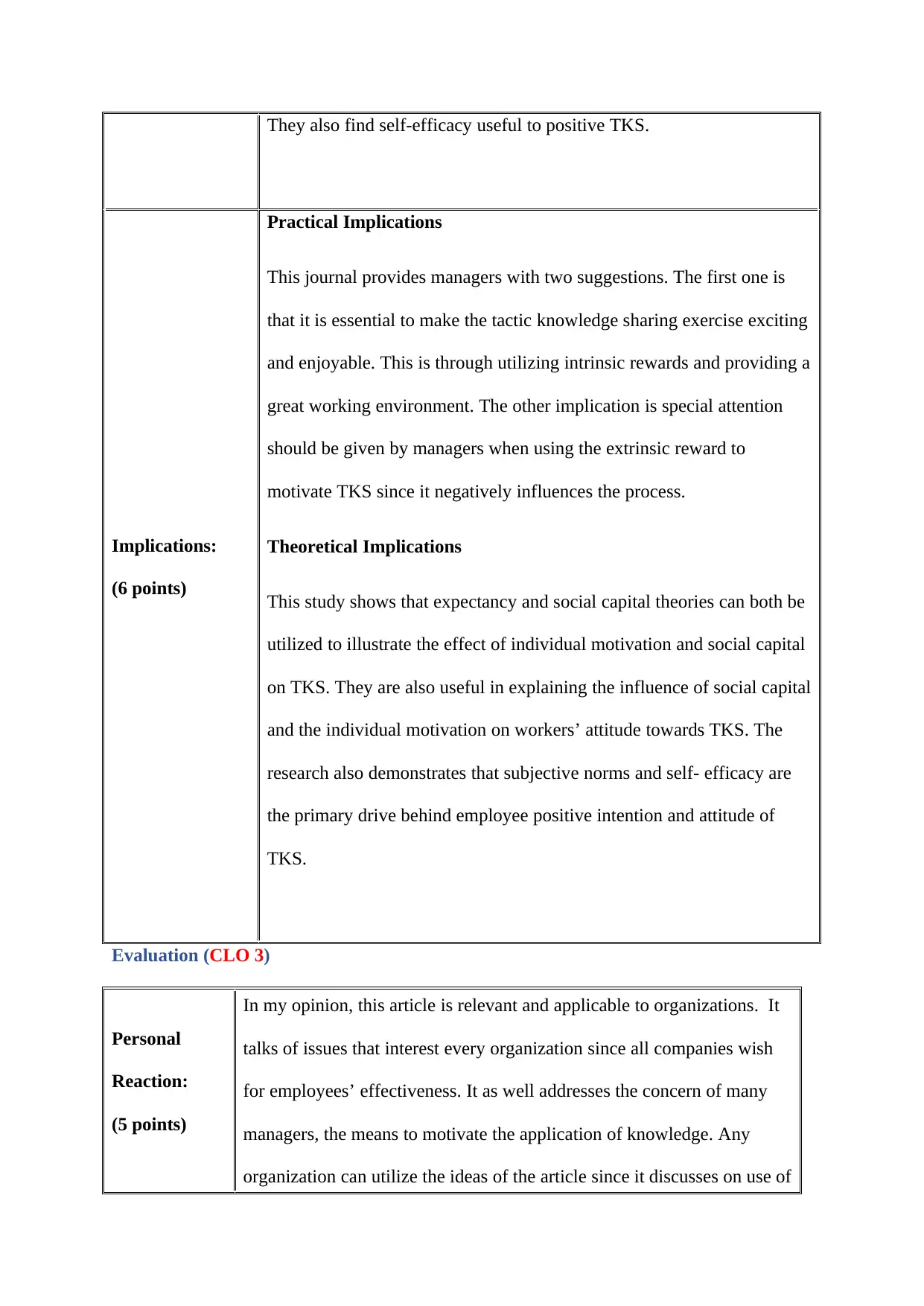
They also find self-efficacy useful to positive TKS.
Implications:
(6 points)
Practical Implications
This journal provides managers with two suggestions. The first one is
that it is essential to make the tactic knowledge sharing exercise exciting
and enjoyable. This is through utilizing intrinsic rewards and providing a
great working environment. The other implication is special attention
should be given by managers when using the extrinsic reward to
motivate TKS since it negatively influences the process.
Theoretical Implications
This study shows that expectancy and social capital theories can both be
utilized to illustrate the effect of individual motivation and social capital
on TKS. They are also useful in explaining the influence of social capital
and the individual motivation on workers’ attitude towards TKS. The
research also demonstrates that subjective norms and self- efficacy are
the primary drive behind employee positive intention and attitude of
TKS.
Evaluation (CLO 3)
Personal
Reaction:
(5 points)
In my opinion, this article is relevant and applicable to organizations. It
talks of issues that interest every organization since all companies wish
for employees’ effectiveness. It as well addresses the concern of many
managers, the means to motivate the application of knowledge. Any
organization can utilize the ideas of the article since it discusses on use of
Implications:
(6 points)
Practical Implications
This journal provides managers with two suggestions. The first one is
that it is essential to make the tactic knowledge sharing exercise exciting
and enjoyable. This is through utilizing intrinsic rewards and providing a
great working environment. The other implication is special attention
should be given by managers when using the extrinsic reward to
motivate TKS since it negatively influences the process.
Theoretical Implications
This study shows that expectancy and social capital theories can both be
utilized to illustrate the effect of individual motivation and social capital
on TKS. They are also useful in explaining the influence of social capital
and the individual motivation on workers’ attitude towards TKS. The
research also demonstrates that subjective norms and self- efficacy are
the primary drive behind employee positive intention and attitude of
TKS.
Evaluation (CLO 3)
Personal
Reaction:
(5 points)
In my opinion, this article is relevant and applicable to organizations. It
talks of issues that interest every organization since all companies wish
for employees’ effectiveness. It as well addresses the concern of many
managers, the means to motivate the application of knowledge. Any
organization can utilize the ideas of the article since it discusses on use of
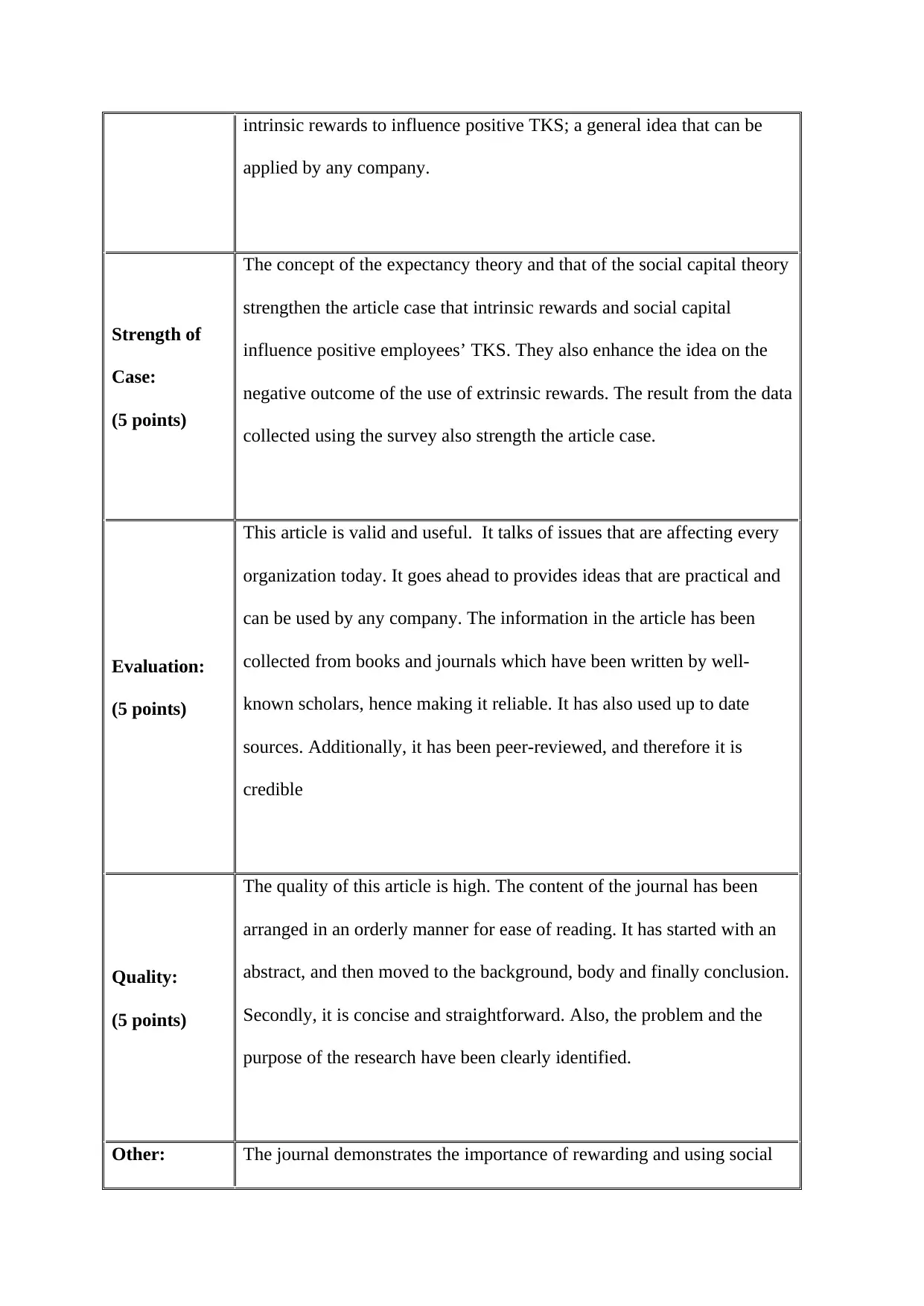
intrinsic rewards to influence positive TKS; a general idea that can be
applied by any company.
Strength of
Case:
(5 points)
The concept of the expectancy theory and that of the social capital theory
strengthen the article case that intrinsic rewards and social capital
influence positive employees’ TKS. They also enhance the idea on the
negative outcome of the use of extrinsic rewards. The result from the data
collected using the survey also strength the article case.
Evaluation:
(5 points)
This article is valid and useful. It talks of issues that are affecting every
organization today. It goes ahead to provides ideas that are practical and
can be used by any company. The information in the article has been
collected from books and journals which have been written by well-
known scholars, hence making it reliable. It has also used up to date
sources. Additionally, it has been peer-reviewed, and therefore it is
credible
Quality:
(5 points)
The quality of this article is high. The content of the journal has been
arranged in an orderly manner for ease of reading. It has started with an
abstract, and then moved to the background, body and finally conclusion.
Secondly, it is concise and straightforward. Also, the problem and the
purpose of the research have been clearly identified.
Other: The journal demonstrates the importance of rewarding and using social
applied by any company.
Strength of
Case:
(5 points)
The concept of the expectancy theory and that of the social capital theory
strengthen the article case that intrinsic rewards and social capital
influence positive employees’ TKS. They also enhance the idea on the
negative outcome of the use of extrinsic rewards. The result from the data
collected using the survey also strength the article case.
Evaluation:
(5 points)
This article is valid and useful. It talks of issues that are affecting every
organization today. It goes ahead to provides ideas that are practical and
can be used by any company. The information in the article has been
collected from books and journals which have been written by well-
known scholars, hence making it reliable. It has also used up to date
sources. Additionally, it has been peer-reviewed, and therefore it is
credible
Quality:
(5 points)
The quality of this article is high. The content of the journal has been
arranged in an orderly manner for ease of reading. It has started with an
abstract, and then moved to the background, body and finally conclusion.
Secondly, it is concise and straightforward. Also, the problem and the
purpose of the research have been clearly identified.
Other: The journal demonstrates the importance of rewarding and using social
Paraphrase This Document
Need a fresh take? Get an instant paraphrase of this document with our AI Paraphraser
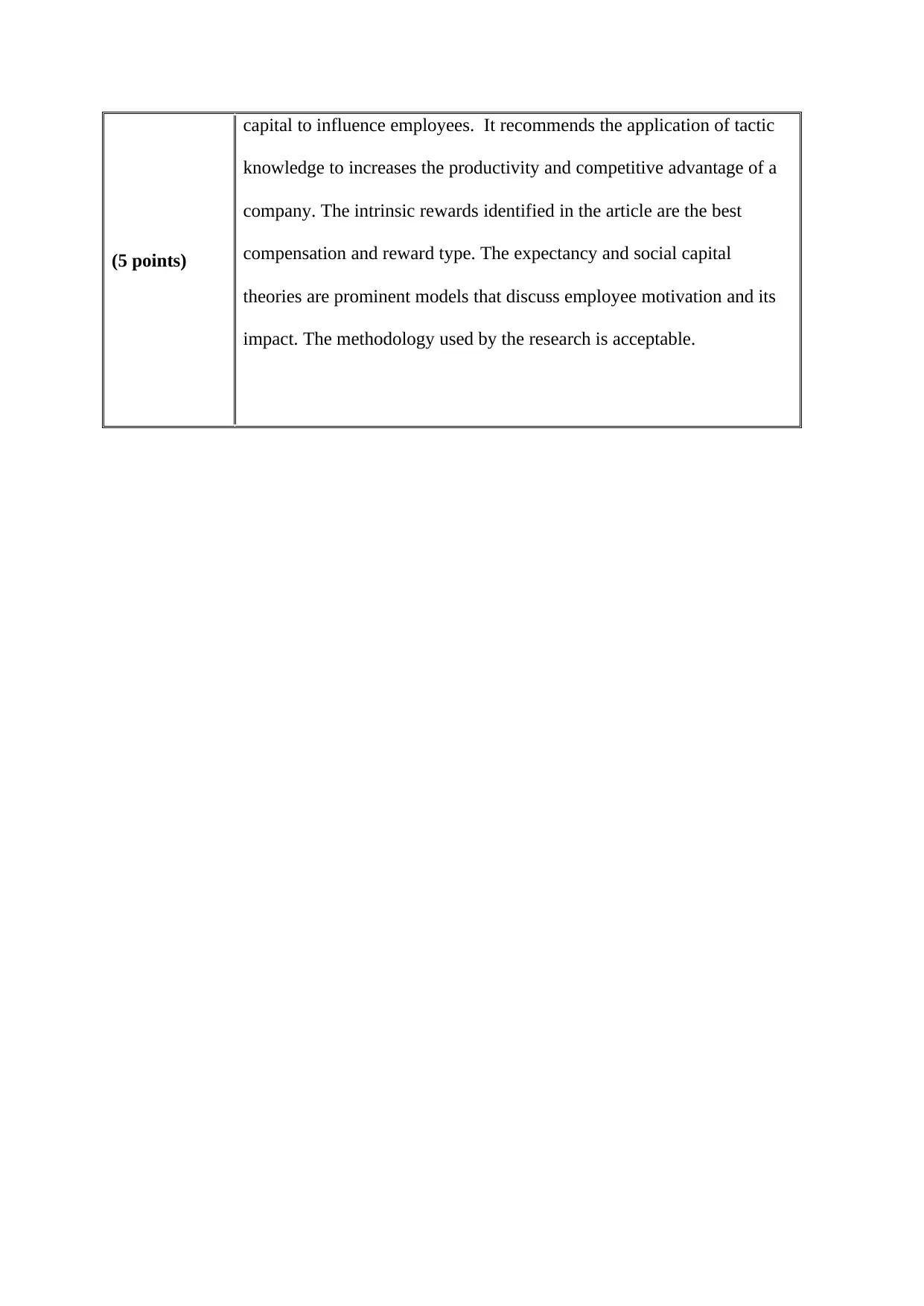
(5 points)
capital to influence employees. It recommends the application of tactic
knowledge to increases the productivity and competitive advantage of a
company. The intrinsic rewards identified in the article are the best
compensation and reward type. The expectancy and social capital
theories are prominent models that discuss employee motivation and its
impact. The methodology used by the research is acceptable.
capital to influence employees. It recommends the application of tactic
knowledge to increases the productivity and competitive advantage of a
company. The intrinsic rewards identified in the article are the best
compensation and reward type. The expectancy and social capital
theories are prominent models that discuss employee motivation and its
impact. The methodology used by the research is acceptable.
1 out of 8
Related Documents
Your All-in-One AI-Powered Toolkit for Academic Success.
+13062052269
info@desklib.com
Available 24*7 on WhatsApp / Email
![[object Object]](/_next/static/media/star-bottom.7253800d.svg)
Unlock your academic potential
© 2024 | Zucol Services PVT LTD | All rights reserved.





